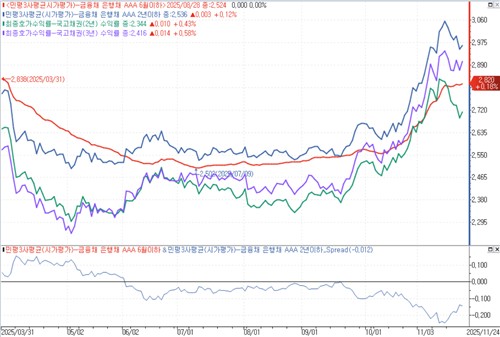(Seoul=Yonhap Infomax) Hye Rim Pi – The previously volatile credit market is showing signs of rapid stabilization.
Institutional buying has picked up, with demand concentrated in bonds maturing in one to two years. However, pressure remains on ultra-short-term and mid-to-long-term maturities.
With expectations that the Bank of Korea will keep its policy rate unchanged, investors remain uncertain about the long-term outlook, resulting in diverging sentiment across different maturities.
Investor Sentiment Rebounds Sharply in Short-Term Segment
According to Yonhap Infomax’s ‘Comprehensive Screen’ (Screen No. 5000) on the 25th, the spread between the average yield of two-year ‘AAA’-rated bank bonds and Treasury bonds stood at 25.0 basis points (bp) as of the previous day.
This spread, which widened significantly from 14.4bp on the 3rd to 26.2bp on the 20th, has since narrowed slightly as market conditions stabilized.
Earlier this month, a sharp rise in Treasury yields fueled anxiety in the credit market. However, since mid-last week, sentiment has rebounded swiftly, particularly in the one- to two-year segment, where the policy rate is seen as having limited impact due to expectations of a rate hold.
Concerns over bank bonds—which had weighed on the credit market—have also eased.
“With the probability of a rate hike over the next year appearing low, and considering funding costs, maturities of one to two years are attractive for buyers,” said a bond dealer at a securities firm. “The resumption of repo fund executions has also contributed to stability in this segment.”
On the previous day, Woori Bank raised 350 billion won ($264 million) in 18-month bonds at a yield 2.7bp below the market average. On the same day, Korea Development Bank and Korea SMEs and Startups Agency issued 27-month bonds at yields 2.5bp below the market average.
Earlier this month, commercial banks faced heavy supply pressure, raising as much as 1 trillion won ($755 million) in a single issuance. However, this pace is expected to slow toward year-end.
“Bank bond issuance is winding down, so supply is limited,” the dealer added. “Whenever an offering is announced, it is quickly oversubscribed.”
The government bond market showed similar trends. On the previous day, Korea Gas Corporation auctioned 120 billion won ($90 million) each in two- and five-year maturities. The two-year tranche attracted 850 billion won ($641 million) in orders, allowing the spread to be set 3bp below the market average. The three-year tranche was priced 1bp below the market average, with 450 billion won ($339 million) in bids.
On the same day, Korea Land & Housing Corporation issued five-year ‘AAA’ special bonds at par with the market average, while Korea SMEs and Startups Agency issued two-year bonds at par as well.
Ultra-Short-Term Remains Weak; Mid-Term Outlook Uncertain
However, sentiment for other maturities remains sluggish. Ultra-short-term bonds, in particular, are facing seasonal demand weakness, making it difficult to attract buyers.
“For maturities around one year, the impact of a rate hold is limited, so there is some room for demand. But for bonds maturing in less than 60 days, it is difficult to secure buyers,” said an investment banking industry source.
Indeed, while the rise in six-month bank bond yields has slowed, the upward trend persists—contrasting with the recent decline in two-year bank bond yields.

As year-end approaches, inflows from final demand sources such as money market funds (MMFs) have slowed, further dampening seasonal demand for ultra-short-term bonds.
“Current credit demand is driven more by institutions seeking next year’s returns than by real end-money like MMFs,” said another bond dealer at a securities firm. “As a result, there is greater demand for slightly longer durations rather than ultra-short maturities.”
Uncertainty over the direction of the policy rate is also weighing on the mid-to-long-term segment. On the previous day, Korea South-East Power Co. canceled its planned five-year bond issuance after the auction. The company had initially planned to issue a total of 110 billion won ($83 million) in three- and five-year bonds, but received 160 billion won ($121 million) in orders for the three-year tranche and 60 billion won ($45 million) for the five-year. Ultimately, the five-year issuance was canceled, and the company issued 110 billion won ($83 million) in three-year bonds at a yield 27bp above the equivalent Treasury bond.
phl@yna.co.kr
(End)
Copyright © Yonhap Infomax Unauthorized reproduction and redistribution prohibited.

